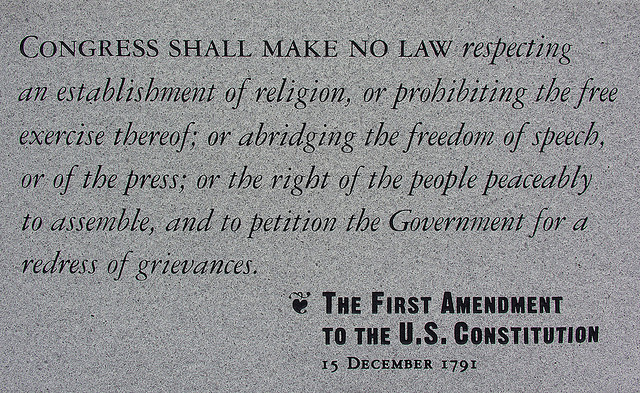


How Free Is Free Speech On Social Media? The Courts Are Weighing In
By Thom Fladung/Hennes Communications
The wild west of social media just keeps getting wilder, doesn’t it?
Consider these court rulings, from the past few months:
- In Virginia, a federal appeals court ruled that an elected official violated the First Amendment by temporarily blocking a constituent on Facebook, the Washington Post reported.
- In Northeast Ohio, a Parma man is suing the city of Parma and a Parma police officer after being acquitted of a felony charge of disrupting public services for creating a Facebook page that parodied the official Parma Police Department Facebook page. That situation has been covered in more depth by cleveland.com.
- As reported in the Akron Beacon Journal, a woman in Coventry Township, in Ohio, was sentenced to three days in jail, 30 days of house arrest and a one-year ban from social media for inducing community panic after a judge ruled she knowingly made false statements on Facebook about a weapon in her child’s school.
Wild times, eh?
Rapidly evolving times might be more accurate, says Patrick Kabat, a First Amendment lawyer who practices with the Chandra Law Firm in Cleveland and teaches First Amendment law at the Cleveland-Marshall College of Law, where he runs a public-interest First Amendment program.
Understanding the evolution of legal thought as well as best communications practices can be crucial for crisis communications and reputation management issues on social media – where reputations increasingly are made and lost.
While developments around cases involving protected speech and social media continue to accelerate, Kabat emphasizes, “The rules haven’t changed.” That is, he said, “clean application of longstanding principles” around free speech rights must carry the day when social media issues come under legal scrutiny.
Kabat says those rules are in play when public officials attempt to limit or regulate private speech on their social media sites.
“Twitter is the public square,” Kabat says, adding, “Government officials don’t always think through the consequences of what they think of as a private act on a public forum.”
In the Virginia case, as the Washington Post reported, a unanimous ruling from the 4th Circuit of the U.S. Court of Appeals was the first from an appeals court to affirm that free speech protections prevent public officials from barring critics from their social media feeds. The bottom line here: If a public official uses social media for government communications, it’s a public forum and anyone can comment – troll or no – with First Amendment Protection.
Other cases are playing out in other courts, including whether President Donald Trump can block people from his @realDonaldTrump Twitter account, under the argument that the account “is neither owned nor controlled by the federal government,” the Washington Post reported.
“Politicians are not legal scholars,” Kabat says. “They wear different hats as candidates, public servants, and private citizens, and pursue different interests, often at the expense of speech freedoms that serve deeper democratic interests.”
Meanwhile, a federal judge refused to dismiss the Parma man’s lawsuit, citing his free speech rights to create a Facebook page poking fun at the police. “Plaintiff alleges facts, which if proven, show that the officer defendants abused their police power to punish plaintiff for exercising his First Amendment rights,” U.S. District Judge Dan Polster wrote in his decision. “Absent a significant disruption in police operations, plaintiff cannot be harassed or prosecuted for his speech.” Kabat’s firm is representing the plaintiff.
In the case of the Coventry Township woman’s year-long ban from social media, the judge’s sentence would seem to fly in the face of these free speech decisions. Kabat calls that ban “flagrantly unconstitutional” – and cites a U.S. Supreme Court ruling for support.
In 2017, the Supreme Court took on Packingham v. North Carolina and the North Carolina law that made it a felony for a registered sex offender “to access a commercial social networking Web site where the sex offender knows that the site permits minor children to become members or to create or maintain personal Web pages.”
“This case is one of the first this Court has taken to address the relationship between the First Amendment and the modern Internet,” the opinion noted.
While acknowledging the import and sensitivity of providing protections against child sex offenders, the court struck down the law, saying: “With one broad stroke, North Carolina bars access to what for many are the principal sources for knowing current events, checking ads for employment, speaking and listening in the modern public square, and otherwise exploring the vast realms of human thought and knowledge. Foreclosing access to social media altogether thus prevents users from engaging in the legitimate exercise of First Amendment rights. Even convicted criminals—and in some instances especially convicted criminals—might receive legitimate benefits from these means for access to the world of ideas, particularly if they seek to reform and to pursue lawful and rewarding lives.”
Supreme Court Justice Anthony Kennedy added in the opinion: “While we now may be coming to the realization that the Cyber Age is a revolution of historic proportions, we cannot appreciate yet its full dimensions and vast potential to alter how we think, express ourselves, and define who we want to be. The forces and directions of the Internet are so new, so protean, and so far reaching that courts must be conscious that what they say today might be obsolete tomorrow.”
In other words, it’s evolving, rapidly. And it’s on you to keep up.
Coming in our next newsletter: But what if you’re a private business? Can you make your own rules about social media as an employer and on your publicly accessible social media accounts? Find out why taking a hard line takes a back seat to creative thinking.